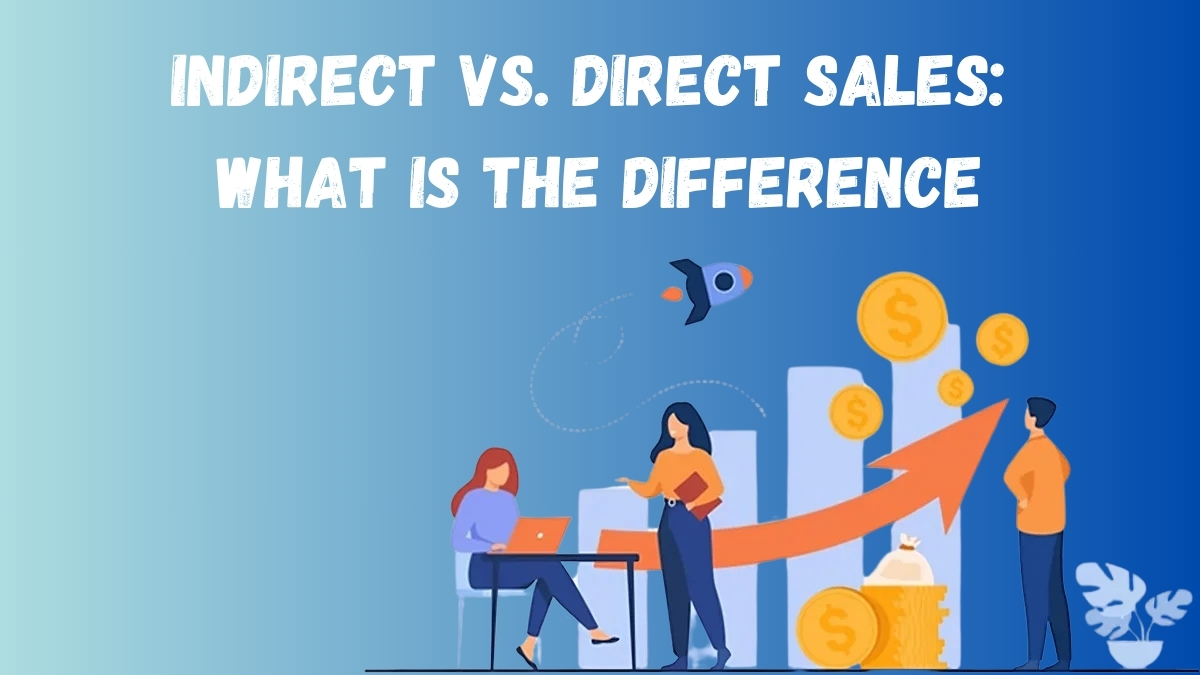If you’ve been looking for a sales approach that puts you closer to your target audience and allows you to manage the entire sales process without depending on traditional retail channels, direct selling may be the answer.
This sales model helps you quickly adapt to changing customer needs, especially when you’re dealing with a diverse client base.
At VH Info, we see direct sales as a powerful way for small business owners and larger enterprises alike to connect with potential customers while building strong relationships and continuous improvement in their strategies.
This article breaks down what direct sales is, highlights direct sales examples, and shows how you can apply these proven tactics to your own business. We’ll also cover the types of direct sales, how they work in practice, and the best practices for success.
Let’s get started.
What is Direct Sales?

Direct sales is a business model where sales representatives reach out to potential customers in a non-retail environment, such as through phone calls, social media platforms, or face-to-face events. These direct seller interactions eliminate the need for third-party retailers.
Instead of relying on traditional retail channels, the sales team promotes products or services directly to customers, making the process personal as well as more flexible.
The Federal Trade Commission often clarifies that direct selling is about personal engagement. Rather than distributing products through big box stores, companies rely on their sales representatives to connect with a target audience.
This connection can lead to a deeper customer experience and more accurate customer feedback. It’s an effective way to reach new customers quickly when done right, and it’s popular in the United States and elsewhere.
Types of Direct Sales

There are many types of direct sales models you can use to connect with your customer base.
Let’s look at some of the most common ones.
Single-Level Sales

Single-level sales involve direct salespeople who focus on one-to-one interactions. In this model, direct seller agents typically earn commissions based on individual efforts.
A primary example is the personal selling of products like cosmetics or wellness products to potential customers without involving multiple layers of recruiting or sales goals beyond the individual’s sales.
Multi-Level Sales

Multi-level sales, often called network marketing, is built on recruiting and building teams. In addition to earning revenue from your sales, you can earn from the sales made by people in your downline.
This approach can generate lead generation through existing customers who become sellers.
However, some network marketing operations veer into pyramid scheme territory if they rely too heavily on recruitment instead of actual product sales. The key is to emphasize legitimate products, real customer value, and transparent best practices.
Party Plan
Party plan selling is a unique direct sales model based on hosting social events where a sales representative can demonstrate products and generate new leads. For example, using platforms like Lyyti can make organizing these events, managing attendee lists, and following up with leads far more efficient.
The “party” creates a more relaxed environment, encouraging open conversations about customer pain points and helping the sales representative gauge the conversion rate on the spot.
This structure often relies on personal selling but in a group setting, making it a friendly setting for showcasing goods like kitchen products, beauty essentials, and more.
Door-To-Door Sales

Door-to-door sales is an older, yet still relevant, direct sales method in which salespeople physically approach potential customers at their homes. It’s time-intensive and involves facing a lot of rejections, but it can still be effective if your unique needs align with this approach. Small business ventures and local service providers sometimes rely on this direct marketing tactic to build a local client base.
Direct-To-Consumer (D2C) Sales

Direct-to-consumer (D2C) means the brand sells products straight to the end user via online stores, pop-ups, or even mobile apps. This method bypasses wholesalers or retailers, enabling you to set your prices and maintain tight control over the customer experience.
You’ll see this a lot among e-commerce brands that build relationships through social media channels and email marketing, rather than stocking their products in retail locations.
B2B Sales

While we often think of direct selling as a consumer-focused strategy, business-to-business (B2B) sales can also adopt a direct approach. A sales team might reach out individually to companies to pitch software, equipment, or specialized services.
This removes the need for distributors, allowing you to fine-tune your pitch for every potential B2B buyer. It can be an effective way to cater to larger organizations with specific goals and budgets.
Subscription-Based Sales

With subscription-based sales, customers pay recurring fees to receive products or services on a regular schedule. Think of monthly wellness product boxes or SaaS solutions that automatically renew.
This direct sales business model thrives on building relationships, as you want to establish ongoing loyalty rather than rely on a single purchase.
Telemarketing

Telemarketing relies on phone calls to connect with potential customers. Many established and newer direct sales companies use telemarketing to pitch in real-time, answer questions, and process orders quickly.
It’s a way to reach a broader audience, gather immediate customer feedback, and pivot your sales tactics if a method isn’t resonating.
How Does Direct Sales Work?

The direct sales process can be flexible, but a few consistent steps guide a smooth operation.
Below is a breakdown of how direct sales typically work from start to finish.
Company Setup
Before anything else, you define products or services that solve real pain points for a target audience. This stage also involves creating a marketing strategy, clarifying brand messaging, acquiring necessary licenses, and structuring logistical details. For instance, if you’re selling wellness products, you’d ensure that your supply chain is in place and your fulfillment process is ready to go.
Recruitment and Training
Next up, the sales team is assembled. Some direct sales companies employ full-time staff, while others rely on independent contractors.
Training covers product information, communications, compliance (especially regarding pyramid scheme issues), and best practices for building relationships with potential customers.
Product Promotion and Sales
Once sales representatives begin selling, they might connect with leads using social media platforms, phone calls, or in-person presentations at social events.
Focusing on effective communication and personal selling can help you address each prospect’s pain points and unique needs. Promotions might include free samples, referral incentives, or discount packages.
Order Processing
Unlike traditional retail channels, direct sales typically manage ordering through each representative.
Orders might be placed via mobile apps, email addresses, or dedicated online portals. The streamlined process ensures that orders can be processed quickly, giving your sales model an agility that’s not always seen in conventional retail.
Customer Support
Customer feedback is incredibly important in direct selling. You might have a dedicated support line, email marketing follow-ups, or online chat tools to handle inquiries and resolve issues. Engaging customers in two-way communication fosters loyalty and helps you refine your offerings.
Compensation and Incentives
Most direct sales representatives receive commissions or bonuses based on the volume of products they sell.
In some structures, they can also earn from the sales of others on their team, as in multi-level sales. Incentives like performance awards, trips, or cash bonuses are particularly common. These rewards help motivate a growing sales force and keep morale high.
Relationship Building
A strong customer experience is critical in this business model.
Maintaining direct contact helps you cultivate a loyal customer base that’s more likely to buy repeatedly. A high-quality relationship increases referrals, feedback, and the likelihood that your clients will share your brand on social media.
Advantages of Direct Sales

Direct sales is a type of selling that has special benefits. These benefits help it stay popular for both companies and people. The main reasons for its success are the personal touch and the direct link between sellers and buyers.
Here are some important benefits of using a direct sales model:
- Personalized Customer Experience: Since you work directly with the client base, you can mold each interaction to match a customer’s preference, whether that means customizing product bundles or addressing individual pain points. This increases the chance for higher conversion rates and builds trust over time.
- Higher Profit Margins: Cutting out intermediaries gives you control over your own sales pipeline and pricing strategy. This control leads to higher profit margins since you’re not splitting revenue with a wholesaler. It’s a straightforward and effective way to maximize earnings on each transaction.
- Stronger Customer Relationships: Working directly with customers fosters deeper connections and better retention rates. Customer feedback is more immediate, so you can resolve issues and keep improving. Over time, these connections turn into brand loyalty and word-of-mouth referrals.
- Flexibility and Low Overhead Costs: Direct sales often require minimal upfront investment and allow you to work on your schedule. This attracts entrepreneurs looking to start a small business without taking on huge expenses. Running your entire operation online is also possible, reducing the need for a physical storefront.
Challenges of Direct Sales

Direct sales have some special benefits, but they also come with unique challenges. Companies and people need to know these challenges to do well in this changing market.
Here are some of the difficulties found in the world of direct sales:
- Time-Intensive Process: Relationship building is essential, and it can be time-intensive. Activities like hosting a party plan gathering, cold-calling, or following up with leads can consume a great deal of time. Workflows can become complicated if your sales tactics rely on one-to-one interactions.
- Risk of Misrepresentation: Some companies skirt the line between legitimate direct selling and a pyramid scheme approach. Ensuring you focus on actual product value rather than recruitment is key. The Federal Trade Commission has guidelines for direct sales businesses, so staying compliant is necessary to protect your brand.
- Limited Scalability Without Teams: If you’re going door-to-door or managing direct outreach on your own, you can only sell so many units per day. To scale, you often need to recruit and train more salespeople or invest in automation. Even then, managing a large team requires advanced oversight.
Indirect Vs. Direct Sales: What Is The Difference?

Indirect sales use intermediaries like wholesalers or retailers to reach new customers. This path can help you tap into an established customer base but generally involves shared revenue and less control over branding.
Direct selling, on the other hand, gives you total control over the sales strategy, pricing, and brand image, resulting in higher profit margins and a more personalized customer experience.
That said, some business owners combine both approaches. They may run a direct sales model for premium or specialized items, using indirect channels for broader distribution.
The right path often depends on your market, your product’s complexity, and your specific goals for expansion.
Tips and Techniques For Using Direct Sales Effectively

Using direct selling strategies can yield excellent results if you fine-tune your methods.
Below are actionable pointers:
- Know Your Audience: Identify who your potential customers are and understand their pain points. The more you shape your sales approach around real needs, the more effective it becomes. Focus on analytics, customer feedback, and consistent observation.
- Build Relationships: Direct selling is about building relationships. Take time to nurture trust and rapport with each prospect by personalizing your communication. A friendly approach often carries more weight in direct sales than a hard-sell tactic.
- Effective Communication: In direct sales, clarity is invaluable. Make sure your messaging is accessible and resonates with your target audience. Tailor each phone call, email marketing copy, or social media post to address their specific pain points.
- Provide Value: Stand out by offering more than just a product. Provide education, share best practices, and show how your product helps people. Acts of service create loyal customers and help your direct sales business grow.
- Utilize Multiple Channels: Learn where your customers spend time. Some might prefer social media platforms, while others are more responsive to phone calls or email addresses. Mixing channels broadens your reach and increases the likelihood of getting the attention of new customers.
- Training and Support: Continual sales training and resources to keep your sales team motivated are important. Foster an environment of continuous improvement by regularly updating product knowledge and refining communication techniques.
- Set Realistic Goals: Plan out clear, specific goals. Maybe you want to sign up a certain number of new customers each month or boost your conversion rate by 10%. Setting achievable targets helps you track—and celebrate—progress.
- Feedback Mechanism: Encourage direct feedback from your customers. Ask for suggestions, monitor reviews, and pay attention to recurring questions. A feedback loop can highlight areas for improvement and spark fresh ideas to keep your operation competitive.
- Continuous Learning: The direct sales landscape evolves quickly, especially with rapid changes in social media. Stay updated on mobile apps, new marketing strategies, or product trends. Refining your approach ensures long-term relevance.
- Measure Performance: Keep track of your metrics. Look at sales volumes, expense ratios, and team performance. Tools like QuickBooks Online can help you manage finances. Analytics also guides data-driven decisions, letting you see which sales tactics produce the best results.
Top Best Direct Sales Companies to Work For

Below are widely recognized direct sales companies. Each offers unique compensation plans, product lines, and cultures. Many of them have established brand loyalty, which gives you a competitive edge as a representative.
Mary Kay

Mary Kay began in the United States and focuses on cosmetics and skincare through a direct sales model, combining a party plan with individual outreach to reach a wide target audience. Its sales team often uses social events and phone calls to connect with potential customers, address their pain points, and emphasize personal selling.
The business model involves direct salespeople who earn commissions on their sales and grow a loyal customer base by tailoring products to unique needs. Mary Kay provides training on best practices, from effective communication to building relationships through social media platforms and email marketing.
Representatives can run their businesses with flexible schedules, which appeals to small business owners who appreciate an effective way to expand their client base and achieve specific goals.
Tupperware

Tupperware is known for its party plan sales strategy, offering kitchenware in a relaxed and fun setting.
At these social events, direct salespeople showcase inventive ways to store and prepare food, and they boost the conversion rate by letting potential customers see the products in real-time.
Tupperware’s direct marketing approach relies on personal connections rather than traditional retail channels, allowing representatives to nurture client relationships.
Many sales representatives find this structure an effective way to match products to unique needs and grow their sales.
Over the years, Tupperware has expanded beyond the United States, uniting business owners worldwide who value a flexible sales process with minimal overhead.
Amway

Amway uses a network marketing model, blending direct selling with multi-level compensation to appeal to a wide target audience.
It has a global presence distributing wellness products, home care, and personal care items, letting direct salespeople operate on their terms. The company prioritizes personal selling and phone calls, but it also allows modern outreach via mobile apps and social media.
Amway has occasionally faced scrutiny by the Federal Trade Commission around pyramid scheme concerns, highlighting the importance of adhering to best practices and emphasizing product value.
Still, its sales approach remains popular, providing opportunities for new customers seeking high-quality items and for representatives committed to building a steady customer base.
Oriflame

Oriflame targets beauty and personal care markets through a direct sales business, focusing on skincare and wellness products backed by a multi-level strategy.
Representatives host social gatherings or use online platforms for lead generation, addressing pain points like convenience and affordability.
The direct sales model here thrives on continuous improvement, so Oriflame invests in training programs that cover product details and sales tactics. Many salespeople rely on email marketing, phone calls, and one-to-one presentations to connect with potential customers.
The company encourages establishing specific goals, emphasizing that a flexible business model can grow steadily through personal selling and relationship building.
Herbalife

Herbalife centers its sales model on nutritional supplements and wellness products that serve health-focused consumers worldwide.
The company uses direct marketing alongside network marketing methods, motivating distributors to handle personal selling, product demonstrations, and phone calls.
An Herbalife sales team can collect customer feedback easily, which helps refine products and address unique needs.
Though some have questioned its structure for possible pyramid scheme elements, Herbalife highlights ethical best practices and invests in representative education to strengthen customer relationships.
Many small business owners find that continuous learning and direct selling techniques help them expand their client base cost-effectively.
Nu Skin

Nu Skin spotlights beauty and wellness solutions through a direct sales model that values personal contact and thorough product knowledge.
It often appeals to consumers seeking premium skincare or nutritional supplements, letting sales representatives share personal success stories. This direct sales approach combines social media platforms and in-person demonstrations to show the advantages of each product line.
Nu Skin offers incentives and an effective way to expand your own business if you maintain specific goals and a solid marketing strategy. By focusing on building trust, partners can grow their conversion rate and form lasting customer connections.
Scentsy

Scentsy uses a party plan system, allowing direct seller consultants to showcase scented products, such as wax warmers, essential oils, home fragrances in casual social events.
Many reps attract new customers by highlighting unique product features and encouraging personal involvement during demonstrations.
The fun atmosphere naturally reduces common pain points, such as lack of product knowledge, and enhances the customer experience. Scentsy also focuses on flexible sales tactics like email addresses, phone calls, and social media messages to nurture ongoing relationships.
Pampered Chef

Pampered Chef offers a party plan focusing on kitchen tools, recipes, and cooking demonstrations.
Representatives connect with potential customers through social events, simplifying meal prep, and addressing everyday cooking pain points. The sales team makes it accessible by suggesting best practices for healthy, budget-friendly dishes that suit a variety of lifestyles.
Maintaining a direct sales business with Pampered Chef often involves building relationships, collecting customer feedback, and using personal selling to propel growth.
This sales approach can suit a small business marketer looking to combine a love of cooking with meaningful engagement.
Young Living

Young Living specializes in essential oils and related wellness products, tapping into direct marketing and network marketing strategies. Many direct salespeople share testimonies about these items through social media platforms, phone calls, and even mobile apps.
The business model centers on connecting with a target audience looking for natural solutions, and generating leads often involves personal selling and free samples. Young Living promotes continuous improvement, guiding sales representatives toward ongoing product education.
As a result, building relationships and fostering a loyal, health-focused customer base becomes a steady path to success.
Usana Health Sciences

Usana Health Sciences provides nutritional supplements and personal care goods via a direct sales approach focused on research-driven quality. Its sales strategy includes social media outreach, building relationships with informed buyers, and gathering customer feedback.
Representatives often set specific goals, track results with tools like QuickBooks Online, and refine their sales model to address shifting wellness trends. This sort of personal selling resonates with health-conscious customers who need direct guidance on product benefits.
Through consistent lead generation and robust sales tactics, Usana’s direct seller network can gain long-term momentum.
Forever Living Products

Forever Living Products highlights aloe vera–based wellness products, offering a direct sales model with a strong emphasis on personal selling and brand authenticity.
Representatives share information about product purity and how it addresses client pain points like health management and skincare concerns.
Combining phone calls, social media messages, email marketing, and in-person events, Forever Living fosters meaningful connections with potential customers.
The sales team’s success stems from a commitment to continuous improvement and honest communication about quality standards.
Many business owners choose Forever Living to build their own sales channels, tapping into a wide range of unique needs across multiple demographics.
FAQ’s:
Is Direct Selling Legal?
Yes, direct selling is legal in the United States and many other countries. However, the Federal Trade Commission warns against operations that rely primarily on recruitment rather than actual sales, as that can indicate a pyramid scheme.
How Do I Start a Career in Direct Sales?
Identify a company or product line you genuinely believe in, learn about its sales tactics, and evaluate its compensation structure. Joining a reputable organization and working with experienced sponsors or mentors is often the best first step.
What Makes Direct Sales Different From Traditional Retail?
Traditional retail typically relies on middlemen and physical or online stores. With direct sales, you sell directly to the end user. This cuts down overhead costs and allows you to customize the customer experience.
Can Direct Sales Be a Full-Time Career?
Yes, many sales representatives make direct sales their primary source of income. Success in a direct sales model depends on product demand, skill, and the level of engagement you bring to your business.
Can You Earn Money With Direct Sales?
Absolutely. Commissions and bonuses can add up, especially if your conversion rate is high. Building long-term relationships and identifying specific goals can boost your sales earnings over time.
Is a Direct Sales Model a Good Idea?
It can be if your product matches the preferences or pain points of a clear audience. Direct sales are also flexible and can fit small business owners looking for low entry costs or large enterprises that want more control over the sales process.
Conclusion
Direct selling is more than a sales model; it’s a direct connection strategy that zeroes in on the customer.
Whether you choose single-level or multi-level, a party plan or D2C, the goal is to increase profitability, strengthen your customer base, and address unique needs without relying on traditional retail channels.
VH Info specializes in SaaS link building, and we admire how direct sales principles can be adapted across different industries for immediate customer impact.
As you refine your own business, remember that consistent relationship-building, honesty, and ongoing training are cornerstones of successful direct marketing.
Creating a strong value proposition, tailoring your pitch to different social media platforms, and tracking each step of the sales process can help you establish a thriving direct sales business that stands out.



